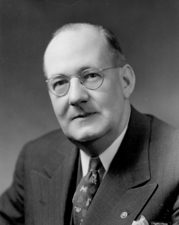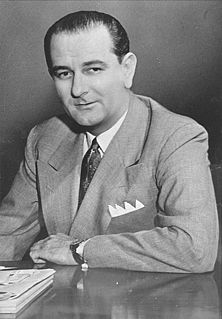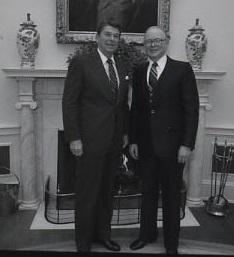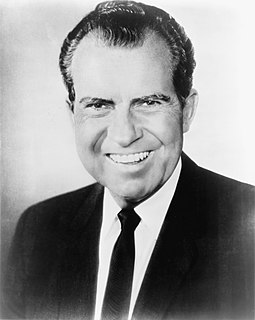Maine gubernatorial election, 1958
|
|
|
 County results Counties won by Clauson Counties won by Hildreth |
|
The 1958 Maine gubernatorial election took place on September 8, 1958. Incumbent Democratic Governor Edmund Muskie, was term limited and seeking election to the United States Senate, thus did not run. Democrat Clinton Clauson, then mayor of Waterville, unexpectedly defeated Muskie's chosen Democratic candidate in the primary, and faced off against the popular previous two term Republican Governor, Horace Hildreth in the general election. Hildreth was the heavy favorite to win, however Clauson was able to narrowly defeat him, retaining the Blaine House for the Democrats.

The Democratic Party is one of the two major contemporary political parties in the United States, along with the Republican Party. Tracing its heritage back to Thomas Jefferson and James Madison's Democratic-Republican Party, the modern-day Democratic Party was founded around 1828 by supporters of Andrew Jackson, making it the world's oldest active political party.

Edmund Sixtus Muskie was an American politician who served as the 58th United States Secretary of State under President Jimmy Carter, a United States Senator from Maine from 1959 to 1980, the 64th Governor of Maine from 1955 to 1959, a member of the Maine House of Representatives from 1946 to 1951, and the Democratic Party's candidate for Vice President of the United States in the 1968 election.

The United States Senate is the upper chamber of the United States Congress, which along with the United States House of Representatives—the lower chamber—comprises the legislature of the United States. The Senate chamber is located in the north wing of the Capitol, in Washington, D.C.
The election was also the last time that Maine would hold its election in September. Traditionally, Maine had held its elections two months before the rest of the nation, which had help give birth to the phrase "As Maine goes, so goes the nation" and its status as a bellwether state. However, following a 1957 referendum, the state constitution was amended to hold all elections after 1958 in November.
"As Maine goes, so goes the nation" is a phrase that at one time was in wide currency in United States politics. The phrase described Maine's reputation as a bellwether state for presidential elections. Specifically, Maine's September election of a governor predicted the party outcome of the November presidential election in 19 out of the 26 presidential election years from 1832 to 1932, or 73 percent of the time. The accurate years were from 1832 through 1844, in 1852, from 1860 through 1876, in 1888, from 1896 through 1908 and from 1920 through 1932.
A bellwether is one that leads or indicates trends; a trendsetter.

Frederick George Payne was an American businessman and politician. A member of the Republican Party, he served as a U.S. Senator from Maine from 1953 to 1959. He previously served as the 60th Governor of Maine from 1949 to 1952.

The 1978 United States Senate elections in the middle of Democratic President Jimmy Carter's term. Thirteen seats changed hands between parties. The Democrats at first lost a net of two seats to the Republicans, and then one more in a special election. Democrats nevertheless retained a 58-41 majority.

The 1964 United States Senate elections coincided with the election of President Lyndon B. Johnson by an overwhelming majority, to a full term. His Democratic Party picked up a net two seats from the Republicans. As of 2019, this is the last time either party has had a two-thirds majority in the Senate, which would have hypothetically allowed the Senate Democrats to override a veto, convict and expel certain officials, or invoke cloture without any votes from Republicans. The Senate election coincided with Democratic gains in the House in the same year.

The 1958 United States Senate elections were elections for the United States Senate which occurred in the middle of President Dwight D. Eisenhower's second term. As is common in midterm elections, the party in the White House lost seats, but losses this year were more than usual, perhaps due to the high unemployment of the Recession of 1958. The Eisenhower Administration's position on right-to-work issues galvanized labor unions which supported Democrats. The launch of Sputnik may also have been a factor.

James Bernard Longley Sr. was an American politician. He served as the 69th Governor of Maine from 1975 to 1979, and was the first Independent to hold the office. In 1949, he married the former Helen Angela Walsh, who died on September 13, 2005. They had five children, including former Republican U.S. Representative James B. Longley Jr.. Longley Sr., a graduate of Bowdoin College in Brunswick, Maine, resided in Lewiston and Auburn, Maine.
The Republican Party of Pennsylvania, commonly known as the PA GOP, is based in Harrisburg in the United States state of Pennsylvania. It is affiliated with the Republican Party of the United States.

John Hathaway Reed was the 67th Governor of Maine, holding office during the 1960s. He was once an Aroostook County potato farmer. Reed was a Republican who took office following the death of Governor Clinton Clauson.
The Maine Democratic Party is the affiliate of the Democratic Party in the U.S. state of Maine. For much of the time after the Civil War, the Democrats were a minor player in a political scene dominated by the Republican Party. However, during the 1950s, Edmund Muskie led an expansive political insurgency culminating in his election as Governor of Maine and successive Democratic elections to both state and national offices. From 2012 to 2019, despite having a Republican Governor in Paul LePage, the party remained strong, holding key offices in the state government and U.S. Congress and maintaining a majority in the Maine House of Representatives for 6 of LePage's 8 years.

United States gubernatorial elections were held on November 2, 2010 in 37 states and two territories. As in most midterm elections, the party controlling the White House lost ground. Democrats did take five governorships from the Republicans, and Republicans took 11 governorships from the Democrats. An independent won one governorship previously held by a Republican. A Republican won one governorship previously held by an independent. Republicans held a majority of governorships for the first time since before the 2006 elections. One state, Louisiana, had no election for governor, but did feature a special election for lieutenant governor.
Clinton Amos Clauson was a Democratic Party politician and the 66th Governor of Maine. Clauson died while in office, having served as governor for just under a year.
Robert N. Haskell was a Maine state senator and the 65th Governor of Maine for five days in 1959.

The 1974 Maine gubernatorial election took place on November 5, 1974. Incumbent Democratic Governor Kenneth M. Curtis was term-limited and could not seek re-election. Independent candidate James B. Longley defeated Democratic Party challenger George J. Mitchell and Republican James Erwin in a tight three-way contest. Longley's victory made him the first independent (non-party-affiliated) governor in Maine's history.

The 1970 Maine gubernatorial election took place on November 3, 1970. Incumbent Democratic Governor of Maine Kenneth M. Curtis chose to seek re-election. Curtis won a landslide victory in the Democratic primary. His general election opponent was Maine Attorney General James Erwin, the Republican nominee. Erwin had also easily won his respective party primary and received the Republican nomination for governor. Curtis narrowly defeated challenger in one of the tightest elections in Maine history – the final margin of victory was a mere 890 votes. Curtis received 163,138 votes (50.14%), while Erwin had 162,248 votes (49.86%).

The 1966 Maine gubernatorial election took place on November 1, 1966. Incumbent Republican Governor John Reed, had been elected to finish the term of Clinton Clauson in 1960, was then re-elected in 1962 and became the state's first four-year Governor. Reed was seeking a second full four-year term, and was challenged by Democrat Kenneth M. Curtis. Curtis defeated Reed, beginning a twenty-year period of Republican isolation from the Blaine House.

The 1960 Maine gubernatorial special election was a special election held to officially elect a governor following the death of Governor Clinton Clauson. It took place on November 8, 1960 with Republican Governor John Reed defeating Democrat Frank M. Coffin.

The 1954 Maine gubernatorial election took place on September 13, 1954. Incumbent Republican Governor Burton M. Cross was seeking a second term which would have made him the fifth consecutive Governor to be elected twice. Democratic state representative Edmund Muskie, widely viewed as the underdog due to Maine's solidly Republican history, was able to pull an upset victory and become the first Democrat to be elected to the Blaine House since Louis J. Brann in 1934, and only the fourth Democrat in the 20th century. His election is widely viewed as the first step in making Maine a two-party state.

The 1944 Maine gubernatorial election took place on September 11, 1944. Incumbent Republican Governor Sumner Sewall, was term limited and could not seek re-election. Republican Maine Senate President Horace Hildreth faced off against Democrat Paul J. Jullien, and defeated him in one of the most lopsided elections in Maine history.

The 1968 United States presidential election in Vermont took place on November 5, 1968, as part of the 1968 United States Presidential Election which was held throughout all 50 states and the District of Columbia. Voters chose three representatives, or electors to the Electoral College, who voted for president and vice president.














